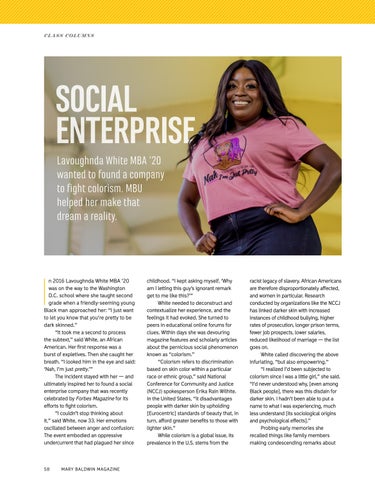C L AS S C O L U M NS
SOCIAL ENTERPRISE Lavoughnda White MBA ’20 wanted to found a company to fight colorism. MBU helped her make that dream a reality.
I
n 2016 Lavoughnda White MBA ’20 was on the way to the Washington D.C. school where she taught second grade when a friendly-seeming young Black man approached her: “I just want to let you know that you’re pretty to be dark skinned.” “It took me a second to process the subtext,” said White, an African American. Her first response was a burst of expletives. Then she caught her breath. “I looked him in the eye and said: ‘Nah, I’m just pretty.’” The incident stayed with her — and ultimately inspired her to found a social enterprise company that was recently celebrated by Forbes Magazine for its efforts to fight colorism. “I couldn’t stop thinking about it,” said White, now 33. Her emotions oscillated between anger and confusion: The event embodied an oppressive undercurrent that had plagued her since
58
MARY BALDWIN MAGAZINE
childhood. “I kept asking myself, ‘Why am I letting this guy’s ignorant remark get to me like this?’” White needed to deconstruct and contextualize her experience, and the feelings it had evoked. She turned to peers in educational online forums for clues. Within days she was devouring magazine features and scholarly articles about the pernicious social phenomenon known as “colorism.” “Colorism refers to discrimination based on skin color within a particular race or ethnic group,” said National Conference for Community and Justice (NCCJ) spokesperson Erika Rain Wilhite. In the United States, “it disadvantages people with darker skin by upholding [Eurocentric] standards of beauty that, in turn, afford greater benefits to those with lighter skin.” While colorism is a global issue, its prevalence in the U.S. stems from the
racist legacy of slavery. African Americans are therefore disproportionately affected, and women in particular. Research conducted by organizations like the NCCJ has linked darker skin with increased instances of childhood bullying, higher rates of prosecution, longer prison terms, fewer job prospects, lower salaries, reduced likelihood of marriage — the list goes on. White called discovering the above infuriating, “but also empowering.” “I realized I’d been subjected to colorism since I was a little girl,” she said. “I’d never understood why, [even among Black people], there was this disdain for darker skin. I hadn’t been able to put a name to what I was experiencing, much less understand [its sociological origins and psychological effects].” Probing early memories she recalled things like family members making condescending remarks about












